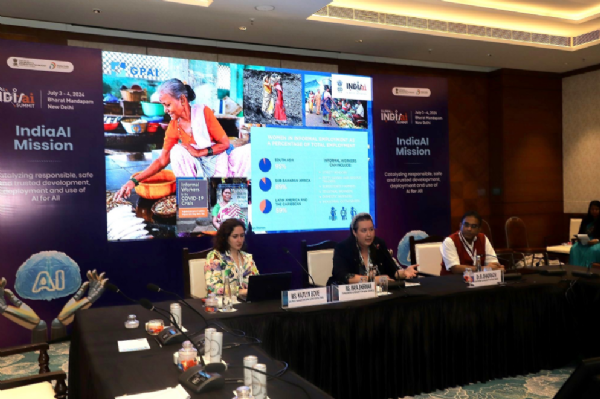The Importance of Compute Capacity
Artificial intelligence (AI) development requires more than just hardware. It involves establishing local data centers, adopting cloud solutions, and building the software necessary to manage AI systems. India, following its Public-Private Partnership (PPP) philosophy, would benefit from a holistic view of compute.
Global AI Prioritization
Vladimir Putin's declaration in 2017 that the nation leading in AI "will be the ruler of the world" put AI on every country's priority list. Since then, global leaders have echoed this sentiment. For instance, China has made AI a national priority, the US under President Joe Biden issued an executive order on AI, the UK hosted a global summit on AI, and AI development and safety have become top agenda items for both the G7 and G20.
India's Early AI Initiatives
India was an early mover in AI with Niti Aayog's publication of the National Strategy for Artificial Intelligence in June 2018. This strategy focused on "AI for All," targeting five priority sectors: healthcare, education, agriculture, smart cities, and smart mobility. In March 2024, the government followed up with the IndiaAI Mission, emphasizing the need to stay ahead in the global race of generative AI and Large Language Models (LLMs).
Funding and Key Pillars
The Cabinet has allocated Rs 10,372 crore (approximately $1.3 billion) towards the IndiaAI Mission. This initiative includes building dataset platforms, innovation and application development centers, and developing future skills. It also focuses on startup financing and ensuring safe and trusted AI. The central pillar, with nearly half the budget (Rs 4,568 crore), aims to build cutting-edge compute capacity to meet local demand and bridge the "AI divide" by providing affordable compute for prioritized sectors.
Evaluating Compute Capacity Goals
The Ministry of Electronics and Information Technology's plan to deploy over 10,000 Graphics Processing Units (GPUs) through strategic public-private collaborations is ambitious. However, this number seems low compared to global standards. For instance, Meta possesses 60 times more GPUs, and even small AI startups globally have more. LLMs and generative AI require massive compute capacity for training and inference; OpenAI used 3,640 petaflops of compute to train GPT-3, whereas 10,000 GPUs translate to just around 25 petaflops.
Governance and Strategic Alternatives
Governance is crucial in managing this initiative. While India has successful national bodies like ISRO and BARC, a central repository of resources managed by bureaucracy has not always been effective. Although the PPP mechanism is mentioned, details are still unclear.
Investing heavily in GPUs may not be the best approach due to the rapid pace of technological advancements. With new models emerging every 12 months and other companies developing AI-specific chips, a strategic alternative could be renting compute from AI cloud providers. This would offer flexibility and potentially more capacity within the same budget. The government should establish strong contractual alliances to ensure sovereign AI capacity is hosted within India's borders.
Holistic Approach to Compute

Compute involves more than just hardware; it includes local data centers, cloud adoption, and software development. As part of the PPP philosophy, India should adopt a comprehensive approach to compute. Both the AI for All strategy and the IndiaAI Mission are commendable steps. The government must now collaborate with industry and geopolitical allies to execute these initiatives effectively and position India as a leader in the AI era.
The Big Computer Problem
Yesterday, something unexpected happened: many computers around the world simultaneously stopped working. Their screens turned blue, a clear sign of malfunction.
Initial Assumptions
Initially, people suspected a major cyber attack. However, it turned out to be a mistake by a company meant to protect these computers.
The Source of the Problem
CrowdStrike, a cybersecurity firm, sent out a security update intended to enhance computer safety. Unfortunately, this update contained an error that caused the computers to crash.
Widespread Impact
This issue was significant because so many daily activities rely on computers. Essential services such as banks and airlines experienced disruptions.
Public Reaction
Many people are upset, believing that CrowdStrike should have tested their update more thoroughly before its release.
Dependence on Technology
This incident highlights our heavy dependence on computers and the internet. When problems arise, they can have global repercussions.
A Silver Lining
Not all computers were affected by this issue. Only Windows-based systems experienced crashes.
Lessons Learned
People are suggesting a need for diversity in the types of computers used for critical functions. Using different systems could prevent widespread disruption if one type encounters problems. It's a reminder not to put all your eggs in one basket.
FOOD SECURITY-India-The world’s next food superpower
Farming in India should be about profits and productivity, not poverty
For years the Araku Valley, deep in the mountains on India’s east coast, was mired in poverty and rocked by Maoist violence. The government classifies most of its inhabitants as “particularly vulnerable tribal groups”; for generations they relied on slash-and-burn farming to scrape by. But now locals grow high-grade coffee that is sold at high prices to posh Europeans. Araku Coffee, the company that processes and markets their berries, runs cafés in fancy bits of Bangalore, Mumbai and Paris. The valley’s transformation is an agricultural success story. It is also a glimpse of what—with the right policies—the rest of rural India might achieve.

No comments:
Post a Comment